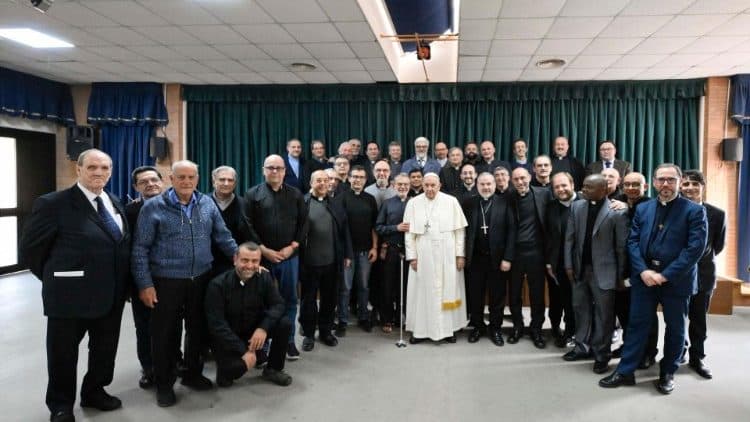ROME – Despite health challenges which recently forced him to either skip or curtail a pair of key Holy Week activities, Pope Francis on Friday nevertheless managed to travel across town in Rome for a roughly 90-minute session with 35 priests serving one of the city’s tough urban peripheries.
Pope Francis made the visit to the parish of Sant’Enrico, located in the northeastern Roman neighborhood of Castel Monastero, in the shadow of the city’s famed Rebibbia prison that once held Mehmet Ali Ağca, who attempted to assassinate Pope John Paul II.
The neighborhood is notorious in Rome in part for a 2022 episode in which a 17-year-old girl was raped by two youths, then forced to drive to her home where the youths also violated her 50-year-old mother. In the wake of the incident, one resident told reporters that the area had been abandoned by the police, turning it into a “Wild West … where anything can happen.”
According to details provided by a spokesman, the pope left the Vatican at 3:50 p.m. on Friday afternoon, arriving at the parish of Sant’Enrico around 4:20 p.m. and remaining until 5:45 p.m., when he left to return to his residence. He became the second pope to visit the parish, after John Paul II celebrated the first Mass of Lent at Sant’Enrico in February 2002.
Although the meeting took place behind closed doors and no transcript was released, clergy who took part described Francis as animated and engaged throughout the conversation.
“It was a beautiful meeting,” said Auxiliary Bishop Daniele Salera, who’s responsible for the northern sector of Rome, calling it “joyous and serene.”
“The presence of the chaplains from Rebibbia prison carried the conversation to the theme of the poor conditions facing inmates. We repeatedly touched on the extreme poverty and the deterioration one often finds among the prisoners; and of how much work, and anything else that promotes their dignity, is important for rehabilitation.”
On other matters, Salera said the importance of the presence of women in the formation of future priests was raised during the exchange, as was planning for next year’s great jubilee.
“The pope asked parish communities to show ‘courage and creativity’ – these were his words – in approaching the Holy Year, utilizing the jubilee time to propose new paths,” he said.
Father Massimiliano Memma, pastor of the parish of Sant’Enrico, stressed the working class character of the neighborhood it serves, noting that residents often have to spend three or four hours every day on public transportation getting into the center of the city for work and then returning at night.
In that context, Memma said, the parish is not only a spiritual center but also basically the lone gathering place for social life, with a network of charitable activities and youth groups. Given the challenges priests in the area face, he said, the pope’s presence was reassuring.
“It’s always good to feel encouraged,” Memma said. “To hear a word of hope from one’s own bishop is nice, it did us good. We know Pope Francis, it’s his style and it’s what we need.”
Friday’s outing marked the fourth parish visit in Rome for the pontiff in the last six months. In September he went to Santa Maria della Salute in the Primavalle neighborhood in the northwestern part of the city, in November he stopped at Santa Maria Madre dell’Ospitalità in southeastern Rome near the Ciampino aiport, and in December he visited the parish of San Giorgio in Acilia, located halfway between urban Rome and the coastal city of Ostia.
Francis’s visit on Friday was not announced in advance, but according to media reports a small crowd of roughly 50 people, mostly mothers and grandmothers on hand to pick up children from the parish school, joined by a few nuns, formed outside the parish hall as news of the pope’s presence spread.
Francis conducted Friday’s meeting in the wake of a demanding Holy Week, which brought reminders of the increasing physical limits for the 87-year-old pontiff.
Francis was forced to omit his homily on Palm Sunday, apparently still suffering from the aftereffects of bouts of bronchitis which had affected his breathing and limited his ability to speak in public. He also skipped the traditional Way of the Cross procession on Good Friday, apparently out of concern that exposure to the cool and humid evening air in Rome this time of year might set back his recovery.
Otherwise, however, the pontiff maintained all the appointments on his calendar, and seemed in relatively good form. Friday’s parish visit thus marks another point along the pontiff’s return to more or les normal activities.












